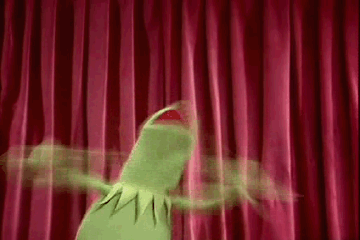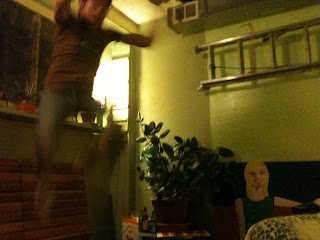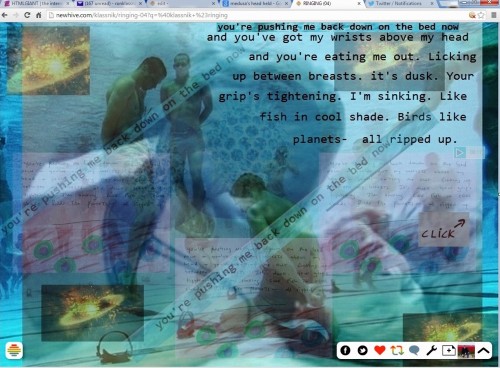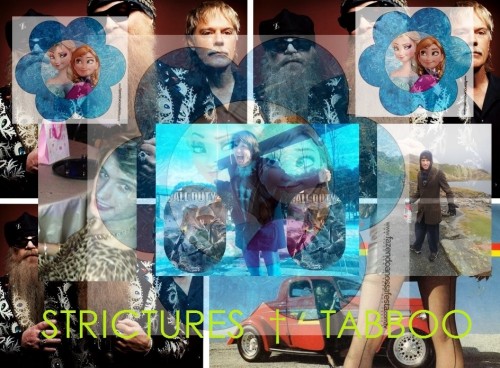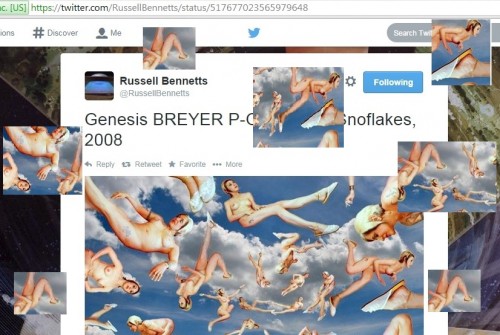25 Points: Gamine
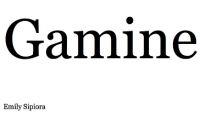 |
Gamine
by Emily Sipiora
forthcoming from Pink Finger Press, 2014
|
1. This book often has a cut-up and and collage kind of feel and sometimes reminds me of Jean Luc Godard’s ‘Pierrot le Fou’ in a way that I can’t fully explain.
2. I don’t really like rhyme or half-rhyme and some of this is rhymed and half-rhymed but somehow it manages to avoid that cloying feeling that rhyme and half-rhyme gives to too much poetry. This is an achievement because most who attempt this don’t manage to accomplish it so well.
3. She’s also doing something with meter, I think, which is brave if so (I haven’t scanned it properly obviously – partly cos scanning is so subjective and party because I didn’t want to). I gave up meter myself, I didn’t like how it mangled my syntax, same with rhyme and the need for a lot of what more traditional poetry bods call masculine endings (stressed syllables at the end of a line). Maybe this type of stuff is due a return. I don’t know. Emily pulls it off pretty well, though.
4. Elliott Smith is a welcome presence in anything that I experience and he pops up here. Sometimes directly quoted and sometimes in bit like ‘Mr Amiability’ (although while I was writing this my girlfriend was asking me to put the HDMI on the TV and it made me think how Elliott Smith could’ve even sung HDMI and made it sound amazingly melancholic. I know the writer likes him and I think he’s a good person to like which is contrary to the way in which a British tabloid recently managed to somehow implicate him from way beyond the grave in the death of British celebrity Peaches Geldolf. After seeing his legacy trotted out in such ridiculously absurdist tabloid terms, it’s nice to have him back and rehabilitated into something real and artistic and appropriate.
5. Ian Curtis pops up now. He joins Elliott Smith. There’s a theme here.
6. “Anyone up at 3am was either in love or lonely” is a great line.
7. “I live in your voicemail now” another great line.
8. There are a lot of great lines here.
9. This author is pretty young, like 17 or 18 or something, I think. This isn’t her first book which is pretty impressive in itself. I was going to say she’s ‘pretty mature for her age’ until I realised it made me sound like an old ageing aunt or something. Maybe this is how it is these days but if she’s getting this kind of thing out there now already, what can we expect in years to come? I’m looking forward to it, whatever it is. All you other Alt-Lit writers, you’re getting old, man! (That was a joke mostly on myself, to be fair).
10. There’s stuff in here that is kind of cut-up image macros of Wikipedia. I read somewhere that someone ‘advised’ Emily to stop putting photos in her books because it makes it seem more like a blog. I think she should put whatever she likes in and perhaps this person maybe hasn’t been looking to closely at the alternative literary scene of the past 5-8 years.
October 9th, 2014 / 12:00 pm
Blake Butler Doesn’t Like Local HTML Giant Reading Posts and We Now Obviously Don’t Care anyway muncie is a large beast that sits in the middle of a burnt out church picking scabs out of its matted fur, flicking them into the rubble and sighing. it sits with its shoulders hunched low to the earth. muncie exists in a state of apathy and boredom. it takes naps several times a day and only ever leaves the walls of the burnt-out church to find food. if you approach muncie, it will not notice you, unless you crawl into its skin and become one of its many scabs (which happens often [it’s called “living there”]). muncie will never figure out what it wants out of life or what it needs to be happy. muncie needs a lot of love and attention, and fewer scabs. or for the scabs to start nurturing the skin of muncie. muncie needs to be taught to let the scabs heal and to walk out into the sun for a bit. that might make it feel better. and if muncie feels better, then muncie might actually try to fix itself. and i need the monster called muncie to stay alive because that monster taught me to be a monster, in my own way, and that is very important to me.
WEDNESDAY OCTOBER 8TH (MUNCIE, IN) 8PM: Muncie, IN presents: A Fiction & Poetry Reading w/ Peter Davis and Austin Hayden and Harry Potter. Everyone who’s never been to or lived in Muncie thinks it’s weird we’re going to Muncie, but Muncie people know that a pilgrimage is necessary.
Mike Young at a PG/Baltimore Adam Robinson reading and leaping off a couch!
…..Birds like planets– all ripped up” (from Ringing)…..
Ed vs. Yummy Fur by Brian Evenson
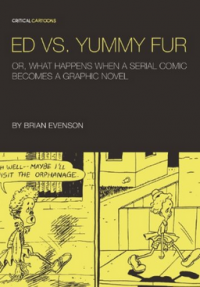 |
Ed vs. Yummy Fur
by Brian Evenson
Uncivilized Books, 2014
128 pages / $12.95 buy from Uncivilized Books
Rating: 10.0
|
A comic like Chester Brown’s Ed the Happy Clown isn’t one that’s easily discussed in polite company. It’s replete with scatology, hyper violence, and vomiting penises that look like Ronald Reagan. “[I]t’s hard to recommend Yummy Fur or Ed the Happy Clown to just anyone without offering a few caveats/qualifiers/warnings,” writes Brian Evenson. Nonetheless, the book is worth talking about—even more specifically, the journey from mini-comic to “a graphic-novel,” which is what Brian Evenson does with incisive detail in Ed vs. Yummy Fur or What Happens When a Serial Comic Becomes a Graphic Novel.
Brian Evenson is the perfect critic for the first installment of Uncivilized Books’s Critical Cartoons series (which also promises a book of criticism on Carl Barks’s work on Donald Duck comics—now available for preorder). As an author renowned for fiction and scholarship that bridges the gap between high- and low-brow cultures—after all this is the author of both Altmann’s Tongue and two Dead Space novelizations—Evenson lends a sense of legitimacy to Ed the Happy Clown as he meticulously examines Chester Brown’s work. Comic books—especially alternative mini-comics—are seldom the subject of serious literary criticism. I can go on and on about the injustices of the Ivory Tower-ensconced literary elite, but Evenson does this with far more aplomb throughout the work, deploying asides questioning the very nature of a “Graphic Novel” versus a comic book or “a graphic-novel” as well as quotations from other critical greats such as Douglas Wolk (although Evenson’s dissection of Wolk’s previous criticism of Chester Brown also becomes a point of contention in Ed Vs. Yummy Fur).
Brian Evenson contends that Chester Brown’s early work—albeit as crass as possible—is important because it redefines an entire genre of sequential art. Evenson places Brown within the same pantheon of deconstructive, comic book auteurs Grant Morrison and Alan Moore, but what’s even more notable than Evenson’s thesis is his own redefinition for what literary criticism can do. Criticism encourages a level of scrutiny that, ultimately, raises the original work up, regardless of its individual merit, and this is exactly what Evenson has done.
October 7th, 2014 / 12:00 pm
if anyone would like to go for a walk with me (in chicago), my email is sampinkisalive@gmail.com.
Several items have been found recently by the Transportation Department. Owners may claim their items at the Transportation Office by this Friday. Call 285-9045 for directions.
-Black “Neff” beanie
-Black umbrella
-Black/red polka dot umbrella
-Navy speckled umbrella
-Digital camera with case (must fully describe to claim)
-Silver earring
-“Association of Objectification of Women School Broadcasters” certificates
-Elimae
-Black/gray running shoes
-Black “Mike Young” tennis shoes
-“Mockingjay” book

-Orange “Sky Zone” sock
-Black sunglasses (2)
-Black sunglasses with silver frames
-Leopard print sunglasses
-Racist Cell phone car charger
-Headphones with remote controls
-Black “ACE” bandage
-Sweater with red/pink hearts
-Gray “Adam Robinson” sweatshirt
-Black brassiere
-Prescription glasses with gold frames
-“No Colony” art posters
-“Kathleen Rooney” headlamp
-Blue bag with drinking glass and plate
-Clear drinking glass with “Sigma Chi” ink pen
-“Molly Gaudry” bowling ball
-White folder with class notes
-“Mary Miller” Bungee cord
-“Kentucky Chen” water bottle
-“Memorex” CD (“#8”)
Russell Bennetts: Why Shld I Read YOUR Book ??
ok, Russell, so why should we read YOUR book ???
You should read MY book because it’s the official (offal) sequel (squeak) to Cynthia, how spells your name?. The difference is seeding.
Cynthia was about all the feelings I didn’t feel while playing an online match of Call of Duty. I didn’t feel angry; I didn’t feel fanous; I didn’t feel frozen.
Look, for example at what Daniel Bosch has to say in praise of my groundpounding efforts:
Russell Bennetts’ lab coat is pristine. In his “Reflections on Taboo-breakng” he has constructed a totem which inscribes precisely, syllogistically, that form of wildness to which we obsessional neurotics feel we are most entitled. Bennetts knows well the savage truth that poems — even “Untitled” poems — have both titles and bodies. He knows that a title personifies that body — it’s a poem’s name — and that the use and abuse of any poem’s name may be pyscho-emotionally freighted. Bennetts knows how often we over-rationalize and abuse poems’ names in transactions that cheapen the energy which animates their bodies — that poems’ titles must be subject to the strictures of taboo.
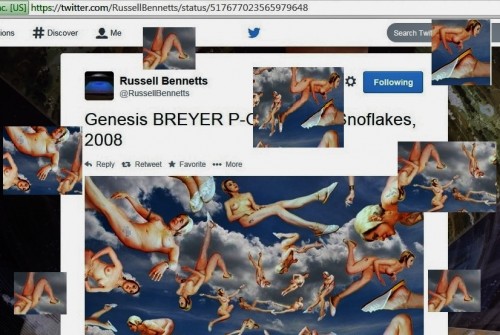
and if that’s not enough for you American raisin heads then how about:
If Bennetts’ “Reflections on Taboo-breaking,” were not the quintessential poem of the long 20thcentury, we might reduce it to a belated Oulipoesis, the holding of a mirror to the blank page which has discovers it as an ideal form: the lipogram in A, B, C, D, E, F, G, H, I, J, K, L, M, N, O, P, Q, R, S, T, U, V, W, X, Y and Z. But his poem’s suppression of the entire alphabet is neither incomprehensible savagery nor empty post-modern gesture. In its silence and stillness, Bennett’s poem stands at the edge of taboo — as we all must — and does not go there.
Those doors, it opened opens where Cynthia opened in its closing scenes. Fanously, Taylor Swift has legs and knows how to use them.
Cynthia dived into the pool feeling 22. Twenty-two years later she (mights) finds herself living in a block of expensive flats. Read on to discover as to the soulless rating of the block of expensive flats.
(Russell Ron Bennetts, Kentish Town 10/2014)
October 7th, 2014 / 10:32 am








